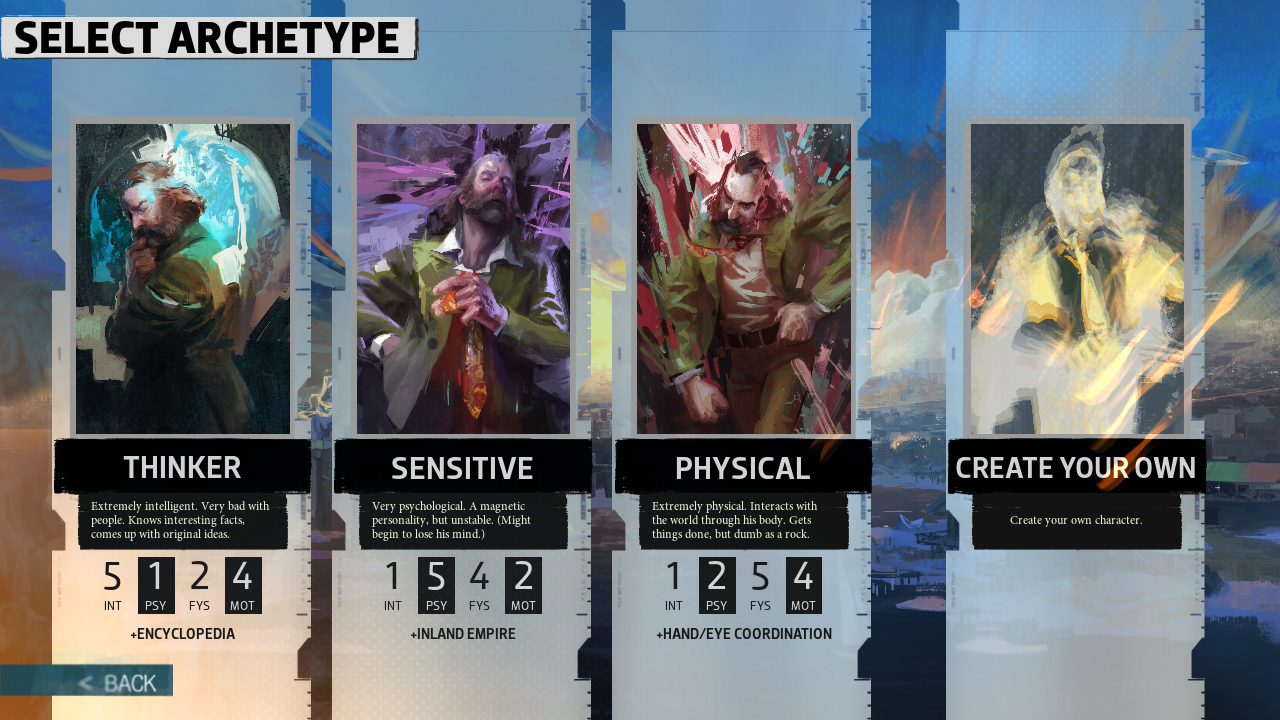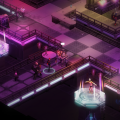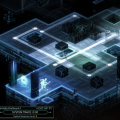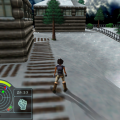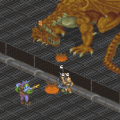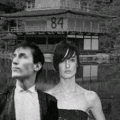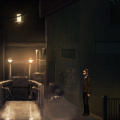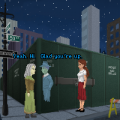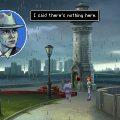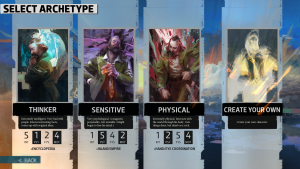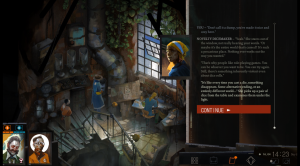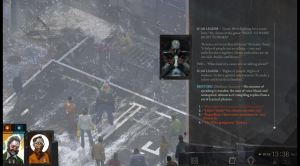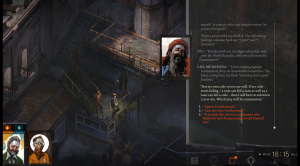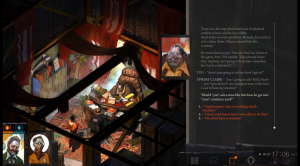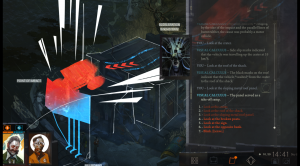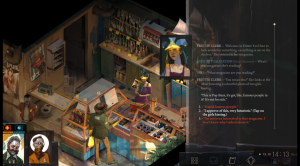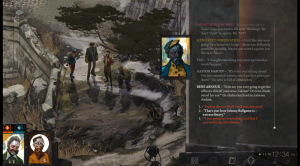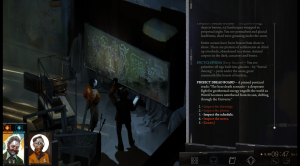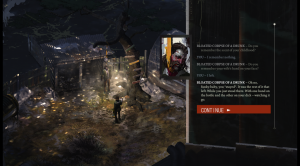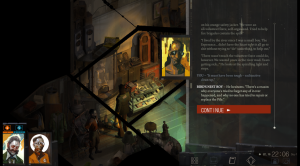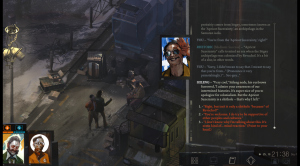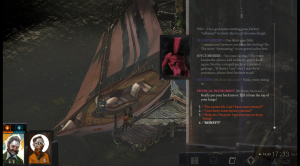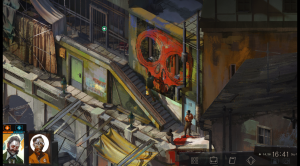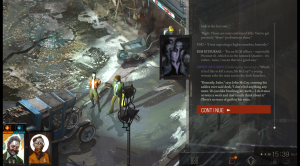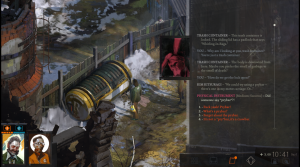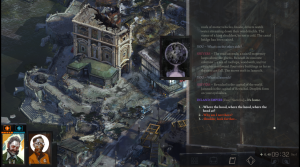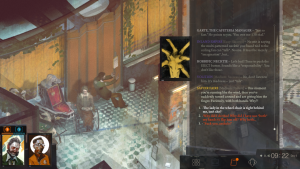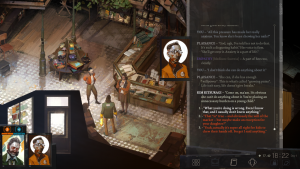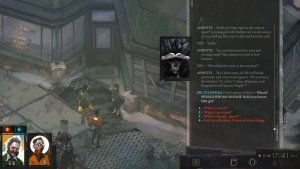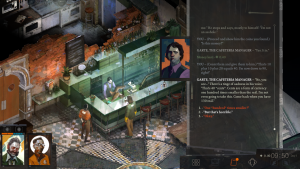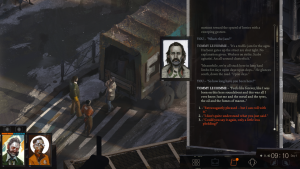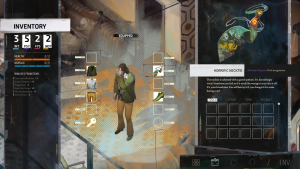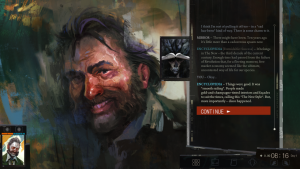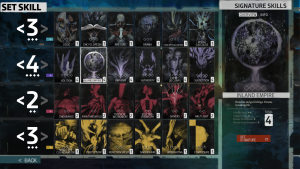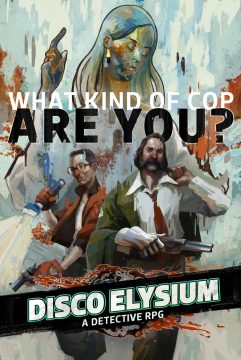
In 1984, an Estonian born Karelian (from the former land of Karelia that’s now divided between Finland and Russia) named Robert Kurvitz came into the world. He would end up singing in a prog rock band, become a novelist, and now he makes video games because he’s super into Dungeons and Dragons. It’s important to keep this in mind because Disco Elysium, his big premier game from his studio ZA/UM, is very much based around his interests and his political reality of being part of a minority that faced a complete economic collapse with the end of the Soviet Union. It’s not subtle about it.
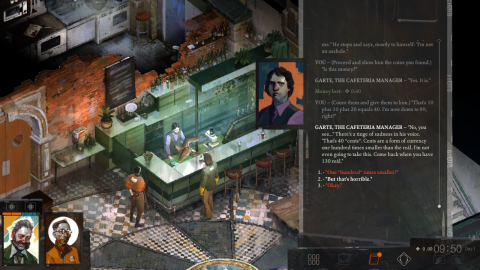
There’s a lot to go over and it can get very confusing (as is usually the case with Eastern European history), but the broad strokes is the country of Karelia has been divided since the 14th century due to Sweden and royal politic nonsense, with Russia getting involved in the 17th century and now what’s left of the land divided between Russia and Finland in part to World War II. They ended up adopting Communism, forming the Karelian ASSR (Karelian Autonomous Soviet Socialist Republic) in 1923, and now its people live in a modern Capitalist reality, complete with neglect since the end of the Soviet Union and a now facing a huge infrastructure collapse.
When you start Disco Elysium, you find yourself in the city of Revachol, the former capital of a dead country that tried to build a new way of life with the rise of Communism and is now a slowly eroding quasi-slum under the control of other foreign Capitalist powers dictating its existence. To say Kurvitz took from his own life in his writing would be an understatement. Your major political factions are Communism, Fascism, Ultraliberalism (aka Right-Libertarianism, closest US comparison being Neoliberalism), and Moralism (aka Centralism). Communism is mostly dead now, Fascists are rising in the form of minority hating reactionaries, Ultraliberalists have championed the modern world’s economic structure in Capitalism, and the Moralist group that controls Revachol, The Coalition, is a pretty obvious stand in for the European Union.
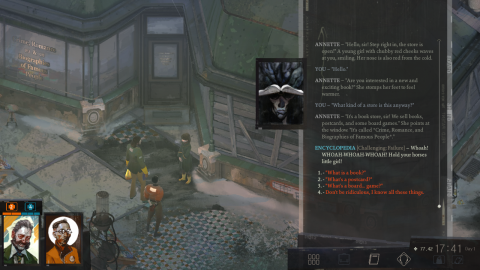
This is one dense political tome, using the language of urban fantasy and a dash of science-fiction to convey ideas and vent frustrations relating to the state of the modern world and especially Kurvitz’s people. They tried to create something new and the world crushed them for it, as the game says of Revachol. Some have said this is the product of some very bitter leftists and that is absolutely accurate, a game that lets you respond to people with comments like “we should grind the owners into fine paste and feed them to the pigs” and “I don’t think grinding one or the other side into pigsfeed will do anyone any favours. I am really, really smart.” What the writers think of the world is worn on the sleeve in blunt comments and biting sarcasm.
That does make the conversation in the non-European west interesting, as those in the USA and Canada have a limited understanding of European history and politics. Thus, the game has mostly been read to North American audiences in a very different, more simplistic frame, focusing more on the Capitalism and Communism angles without really addressing the other meat here. The game is also way more popular than you’d think, stealing four awards at The Game Awards and getting praise all across the board. The secret to this is why the game is fascinating in a larger historical context, it’s also just a really damn good RPG and possibly one of the funniest games ever made.
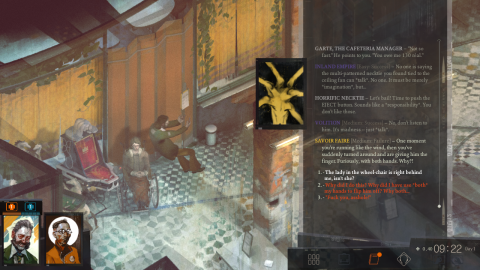
Disco Elysium begins with you arguing with various parts of your subconsciousness, including your ancient reptilian brain, in a black void as you’re eventually awoken to find yourself in a junked up hotel room with a tie on a fan in a very questionable set-up. After a bit of fumbling around, smart math braining the realization that you threw your own shoe through a window, and possibly trying to get said tie and failing because you forgot to turn off the fan and dying of a heart attack, you meet a police lieutenant named Kim Kitsuragi and discover that you too are a cop (much to your absolute shock and confusion). You have somehow lost your memory, probably due to drinking yourself into a coma, and discover that you have made absolutely no progress in solving a recent murder from a week ago. The body is still hanging in a tree. Let the fun begin!
This is very much in the Planescape: Torment school of RPG, playing down every element but actual role playing, the game having no combat system to be found. Instead, everything is decided by dice rolls, and your party is actually about twenty-four voices screaming in your head to do such things like steal from a corpse or lick up spilled booze on a counter (you can just do a quick taste if you want to keep some dignity). Various aspects of your personality chime in with suggestions and obsessive demands constantly, and who speaks up depends on your stats. They can even interrupt dialog at times, distracting you with your own thoughts.
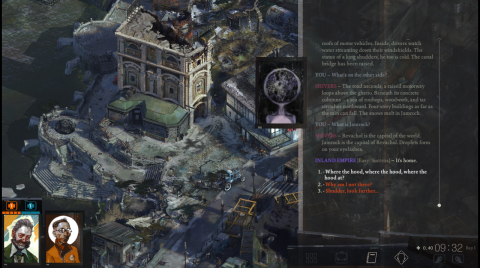
You start building your character deciding on your stats in Intelligence, Psyche, Physical, and Motorics, deciding brain smarts, emotion smarts, body toughness, and body control. Each also has six different aspects of your personality, the larger their number meaning the more likely they’ll chime in. This greatly changes up what you can and can’t accomplish, not to mention what skill checks you get. What’s also interesting is that skill checks aren’t always net positives like they are in any other RPG, as you’re getting them from your extremely stupid and fractured brain. For example, throwing a ball some old guys are playing with because Physical Instrument completely lost his cool upon seeing it results in throwing it far away and angering them because, no, they were not trying to shot put. Time to get a new one! Having high stats is a double edge sword here, but failure can also be a new opportunity.
The game is very much about life, the successes and humiliations we all constantly go through, and somehow being wrong and realizing it after can be a chance for growth or open a new route for us. Not every mistake we make is life destroying or results in having to do murders, something not a lot of games ever seemed to get. The win and lose binary is heavily blurred here, and the common white checks can be redone after you raise your stats if you do fail them and need to pass them for an action to be performed. You got time on your side, the game wants to make clear.
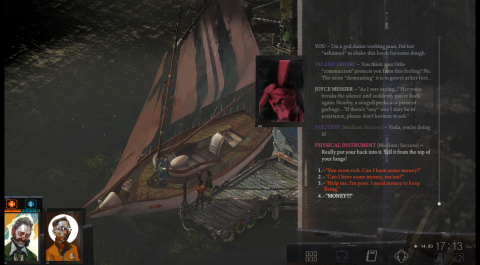
It’s bad at explaining this early on, though. The in-game clock only moves in conversations, where the majority of play takes place, and only when the dialog progresses. You can safely read a paragraph for as long as you want, and some actions outside of convos, like collecting tare for recycling bucks, is a free action. There’s also no time limit for solving the case, though Kim will like you more if you make good early progress. You can do things your way, and you can always come back to anything you’re hung up on. The only thing that triggers significant progress is how much progress you’ve made in your investigation, with more of the city opening up on day three.
There’s also the thought cabinet, an interesting system that lets you further define your character to unlock all sorts of stat bonuses and penalties. Through the game, you’ll unlock thoughts and ideas that become selectable in the cabinet, which lets you focus on a given thought and get a stat bonus or penalty for a set amount of time. When that time is up, you have internalized the thought and gain different bonuses or penalties, plus new dialog options in conversations for the sake of role playing. Internalize Communism, for example, and you can get bonuses for making hard left dialog choices, which of course is mostly saying that we should overthrow Capitalism with violence.
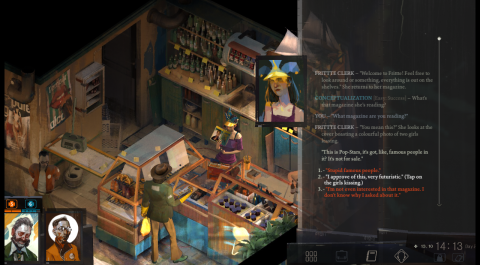
The one down side is that unlocking new slots and de-internalizing thoughts requires the use of a skill point, which you unlock every 100 experience points, gained from completing tasks that move the story or side cases you take on (or steal from corpses, ect). Of course, since having high stats also can be a problem as well as a strength, it seems this system is in place to make you consider ideas in terms of the ideas themselves rather than benefits they could provide.
The writing is also excellent, Kurvitz novel experience shining through with long, meaty, and flowery text walls that still have a pace to them and a strong sense of emotion. A lot of it is also zany, due to your cop being a complete disaster of a person no matter how you play them, and many of the people you meet in the world being equally attention grabbing in wild or mundane ways. Said cast includes two foul mouth kids throwing rocks at bodies who may or may not be on speed, a black white nationalist, a moody trucker just trying to get by as he muses on the way of things, and a kind old lady who’s also obsessed with cryptids. Everyone has layers to them, and finding those layers is the real reward at the game’s center.
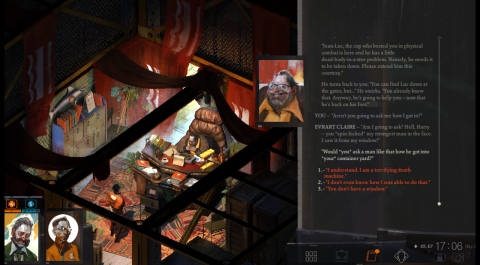
For all of its political and historical talk, the core mystery premise, and endless parade of shenanigans that includes trying to strangle your tie for trying to make you damage a corpse and then calmly explaining to your partner all this, Disco Elysium‘s soul lies in its very real sense of empathy. Not for Fascists, mind you, they’re all basically cartoons, but the most rewarding way to play is to use your emotional intelligence to connect with others and understand them, maybe spin a yarn or share with them a similar pain you feel as they do. Sometimes, this takes the form of punching a speed addicted child and then him becoming your friend who can even potentially became your replacement partner late game. For all its chaotic outcomes, there’s a very warm human center here, exploring both the positive and negative aspects of ourselves and how we connect with others or understand reality.
It helps the beautiful background art creates this very lived in world, a place that has seen some stuff and still stands, if only barely. There’s history everywhere to explore and learn, little mysteries to solve, and quirky characters to meet. The sketchy, colorful character art also creates this interesting energy, everyone looking like some sort of dream concoction, fitting with the cop’s current dream-like state of hazy confusion. It also makes a solid reminder that the world you’re exploring is magical, and the people here are experiencing things on the fringes that remain unexplainable or difficult to believe. It all results in this spot on atmosphere that fits the low mechanics but high involvement design of the game, something you can relax in to read, but not relax to the point you lose focus.
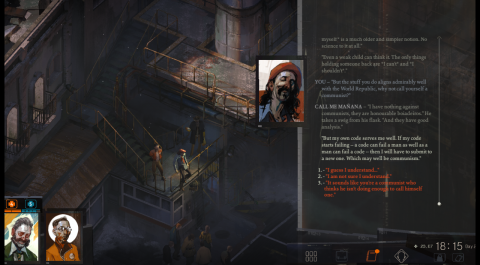
Many have said that Disco Elysium is wildly inventive and possible one of the best RPGs ever made – and those people are right. There’s so many fresh ideas here handled so well that it’s hard not to admire what the game managed to accomplish, and the emotional impact it can have in the process. It’s a fresh take on the genre made with help by building on other classics, and it also lets you walk around in your underwear and rubber gloves if you so desire, so it’s pretty amazing. Go play it and put on the war paint. Your right and left brains agree on this decision. Also, probably a good idea to apologize for colonialism.
